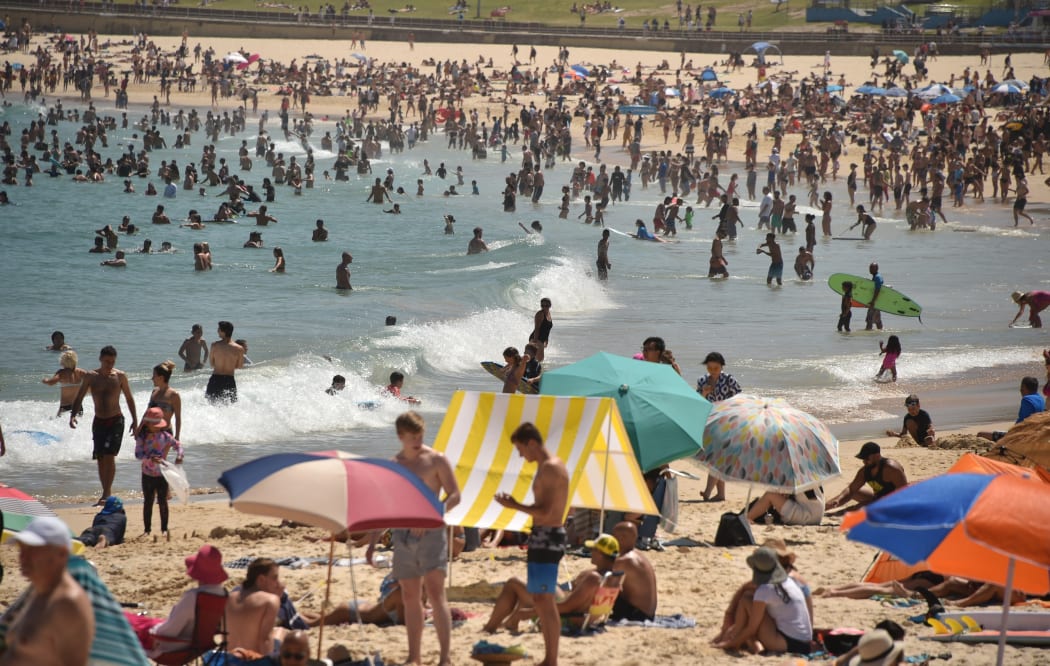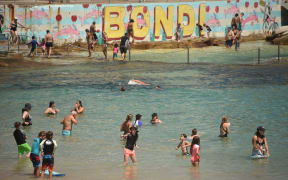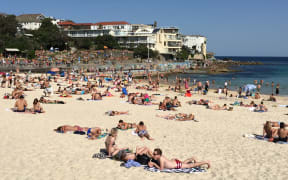Australia is being hit by extreme heatwave conditions this week, with the mercury hitting the high 40s in parts of the country, and temperature records set to topple in NSW.

Bondi Beach, Sydney, during the last heatwave, over New Year. Towards the end of the week, western parts of the city will have temperatures in the low 40s. Photo: AFP
Severe heatwave conditions are forecast from the southern interior of Western Australia, most of South Australia to the east coast of New South Wales, Victoria and northeast Tasmania through to Thursday.
The Bureau of Meteorology is forecasting localised areas of extreme heatwave during the week in eastern Victoria, south-east New South Wales and parts of the pastoral districts of South Australia.
A hot air mass over the interior of #WA will migrate across to southeast #Australia over the coming days. Hot days and warm nights ahead for those areas. For latest forecast and warnings visit https://t.co/4W35o8i7wJ pic.twitter.com/LfwdbhnhBG
— Bureau of Meteorology, Australia (@BOM_au) January 12, 2019
Yesterday, Adelaide reached 39C, while elsewhere in the state in Renmark hit 43C and Oodnadatta a scorching 47C. In Marla, police recorded a 46C on a patrol car thermometer.
Scorching over most of #SouthAustralia today Adelaide hit a top of 40°C and it's even hotter in the north. This police patrol at Marla unofficially recording 46°C on the car thermometer, Maree hit 48°C! Stay safe in the heat @CFSAlerts @SAHealth @SAPoliceNews #FeelingHot2019 pic.twitter.com/8c2wm1QnAu
— Bureau of Meteorology, South Australia (@BOM_SA) January 14, 2019
Temperature records are expected to be broken in parts of New South Wales, including the Riverina, where the mercury is forecast to reach 47C on Wednesday, and the South West Slopes.
Albury is forecast to reach 45.4C and Young 43.9C - which will break annual records for each of those regions.
Towards the end of the week, Sydney will experience severe heatwave conditions, with temperatures reaching the low-30s in the east and low-40s in the west.
Elli Blandford from the Bureau of Meteorology said the heatwave was due to a build-up of warm temperatures from inland Australia being dragged north over NSW and the ACT.
"Maximum temperatures are likely to be about 10 degrees above average for this time of year," she said.
She said Dubbo was expecting five consecutive days above 41 degrees. "That hasn't happened since February 2004, when they had seven days above 41 degrees."
There will be little respite from the temperatures until a southerly change hits the south of the state on Saturday and moves into Sydney and the northern parts by Sunday.
Fire warnings
Victoria's north is set to swelter through a potentially record-breaking heatwave, with temperatures of up to 46C forecast on Wednesday. Towns along the Murray River were bracing for a run of days above 40C, including a forecast of 46C for communities between Mildura and Albury Wodonga on Wednesday.
In Melbourne sea breezes kept the city's temperature to 32C on Monday, the first day of the Australian Open. The tournament has introduced a new heat stress scale which allows 10-minute breaks in men's singles matches for the first time ever in a grand slam tennis tournament, bringing it into line with the women's and junior singles.
Fire warnings have been issued for for south Australia districts for today, as very hot and dry conditions combine with a strong southerly wind change.
Fire Weather Warning issued with Severe fire danger for five SA districts for Tuesday, including the #MountLoftyRanges. Very hot and dry conditions ahead of a strong and gusty southerly wind change. Check warnings here: https://t.co/AeIrdYUQrV Stay safe & fire aware @CFSAlerts
— Bureau of Meteorology, South Australia (@BOM_SA) January 14, 2019
Development 'rethink' to help cool suburbs
Urban heat and ecosystem scientist at Western Sydney University, Dr Sebastian Pfautsch, said Sydney needed to prepare for a future of more heatwaves that were longer lasting and more intense.
To cope with these changes, a "rethink" on urban development and planning, particularly in western Sydney, where he regularly records differences of up to eight degrees in new developments compared to nearby bush land.
"At the moment we're seeing developments for lot sizes that don't even allow to have trees anymore around your house because … there's no space left for trees that could actually help cooling the entire area," he said.
"One thing that we already see is that people become more isolated because there is less and less outdoor life particularly during summer - it's just too hot."
Continuously using air-conditioning on large homes, the use of black roofs and black bitumen on roads also prevents surfaces from cooling down.
Dr Pfautsch said local councils and governments needed to start implementing new strategies to create a "model suburb, where people can actually go and experience how it would feel if you have cool pavement, if you have green streets, everything is tree lined, if you have passive cooling in your house, if you have double glazed windows".
"All of these things I think would be much easier to convey to the public once you can experience them, at the moment I think we are lacking that."
- ABC



